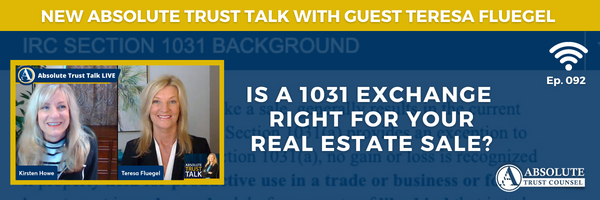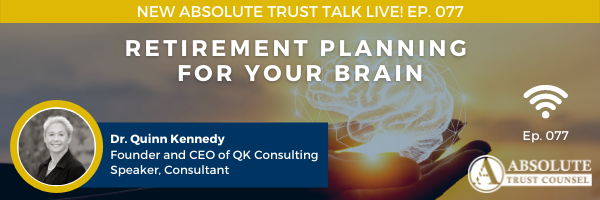Do you own an investment property? Are you thinking about selling it but are overwhelmed by the tax implications? Well, then, we’ve got good news and a great podcast episode for you that might just provide a solution that you may not have known was possible. Ever heard of a 1031 Exchange? (Okay, we’ll end the questions and just get to the good stuff!) In short, a 1031 Exchange allows you to swap one real estate investment property for another while deferring capital gains taxes. It sounds great, but 1031 has A LOT of moving parts you need to understand before attempting to use one. For example, an exchange can only be done with “like-kind properties,” the IRS has a lot of rules and limits when it comes to vacation properties, and there are specific time frames that can be challenging. However, we don’t want to scare you because this can be a very valuable tool if used correctly. So, to help get things straight, we’re bringing in an expert.
In this episode of Absolute Trust Talk, we’re thrilled to welcome Certified Exchange Specialist®️, Teresa Fluegel, to the show. Teresa is Executive Vice President at Chicago Deferred Exchange Company in San Ramon, California. She has over 25 years of experience working with attorneys, accountants, commercial real estate professionals, and investors seeking to defer tax using Section 1031. Teresa is a seasoned expert in navigating the intricacies of exchanges based on her involvement in thousands of transactions including: forward-delayed exchanges, reverse exchanges, and build-to-suit exchanges.
In this episode, we’re going to discuss:
- What a 1031 Exchange is
- How to qualify for a 1031
- How exactly a 1031 Exchange works
- What types of properties are included
- Rules and requirements set forth by the IRS
And more.
If you’ve been considering a 1031 Exchange or are curious about how you can benefit, this episode will turn you into a savvy real estate investor in no time – understanding the complex moving parts, requirements, and how to enlist the professional help you need to get a 1031 Exchange done right. Let’s get started!
Big Three from Episode #092:
- A 1031 Exchange is a tax break that allows you to sell a property held for investment purposes offering the opportunity to defer capital gains taxes on the sale.
- You cannot receive or hold the money from the sale of the property. A third party must hold all proceeds in escrow, which is then used to buy the new property.
- In addition to deferring capital gains taxes, people also use Exchanges to diversify their portfolio – going from owning multiple properties to one or vice versa.
Time-stamped Show Notes:
0:00 Introduction
3:15 Let’s start with a simple breakdown for those who may not know. What is a 1031?
4:40 Listen in as Teresa walks us through how to defer paying capital gains tax on a property you are selling.
6:11 If a client decides they want to do a 1031 Exchange, how do they know if they are qualified?
8:07 In order to use a 1031 Exchange, the property you’re selling must be an investment property. Press play now to find out what types of properties are considered investment properties. Do they include vacation homes, second homes, etc.?
10:13 Okay, so you’ve determined that you are qualified, and your CPA says a 1031 Exchange works. What happens next?
13:00 Did you know that once you close on the property you are selling and the intermediary receives your funds, the clock starts ticking on purchasing a new property? Here’s what you need to know.
15:37 Teresa brings up two critical requirements to keep in mind when identifying new property for purchase. Start listening now to find out what they are.
19:40 Circling back to identifying properties for purchase, Teresa and Kirsten discuss the 200% rule, which means that you cannot give over two times the value of what you sold. Press play for more.
21:29 We’ve talked about what a 1031 is and what the process looks like. Now, let’s discuss why people may do a 1031 Exchange, other than deferring taxes.
22:30 Can you go from one property to multiple or from multiple properties down to one? In short, yes. Listen in as Kirsten and Teresa discuss how this works.
24:38 Earlier in the show, Teresa mentioned the Delaware Statutory Trust (DST), which is a type of real estate-like product that allows you to use a 1031 Exchange to own a portion of an investment. If you’re confused, don’t be. Kirsten and Teresa will explain how it works and the important stipulations you need to know about.
27:37 Can entities, like an LLC, use 1031 Exchanges?
28:56 Next, Kirsten and Teresa shift gears to focus on relative values and use Kirsten’s earlier scenario as an example.
30:53 Did you know that you can still do a form of an Exchange if you buy a new property first and then sell the old one later? It can be done as either a Forward or Reverse Exchange. Start listening now for more.
36:26 Are there restrictions to doing a cash-out refi after a 1031 on a mixed-use?
37:35 Is there a limit on the amount of capital gains tax you can defer?
38:19 Is there a plan B or a backup plan for a failed 1031 Exchange?
40:09 How often or how many times can one person do a 1031 Exchange?
Get in Touch with Teresa Fluegel
EVP, Certified Exchange Specialist®️
Chicago Deferred Exchange Company
San Ramon, CA
T: (415) 596-6749
Teresa.Fluegel@CDEC1031.com
https://cdec1031.com/
Resources/Links Mentioned in this Episode:
- For more about Chicago Deferred Exchange Company, visit https://cdec1031.com
- Absolute Trust Talk Ep. 067 Estate Planning Challenges with Real Estate
- Absolute Trust Counsel would love to offer access to our Incapacity Planning resource page: https://AbsoluteTrustCounsel.com/Incapacity-Planning/. We’ve collected our top planning information all in one place so listeners can find videos, guidebooks, blog posts, a host of information with tips and strategies on implementing, planning, and protecting themselves and their loved ones.
- We’re pleased to provide you with a library of e-books to address common estate planning questions and concerns in practical, easy-to-understand language. https://AbsoluteTrustCounsel.com/Resources/.
- ASK KIRSTEN: If you’d like Kirsten to answer your question on the air, please email her at Info@AbsoluteTrustCounsel.com.
[Ad] Are you a resident of Walnut Creek or the greater East Bay needing help with your estate plan? At Absolute Trust Counsel, your family’s safety is our number one priority. We understand how complicated it can be to know if you’re making the right legacy planning decisions, which is why we’re here to make things easier. Schedule a free discovery call, and let’s talk about how we can help build the right plan for you and your family.






